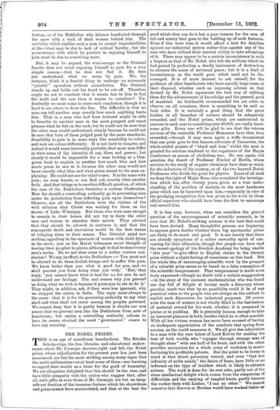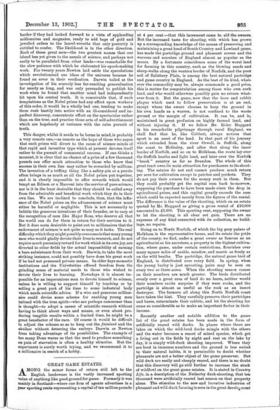THE NOBEL PRIZES.
THIS is an age of munificent benefactions. The Rhodes Scholarships, the free libraries and educational endow- ments which Mr. Carnegie showers right and left, the Nobel prizes, whose adjudication for the present year has just been announced, are but the most striking among many signs that the multi-millionaires--or at least some of them—are learning to regard their wealth as a trust for the good of humanity. We are altogether delighted that this should be the case, and have little sympathy with the cynics who suggest that, after all, such gifts as even those of Mr. Carnegie are but an insig- nificant fraction of the immense fortune which his shrewdness and perseverance have accumulated, and that at the best the good which they can do-is but a poor ransom for the sum of toil and misery that goes to the building up of such fortunes. Even if this were true, it would afford a text for diatribes against our industrial system rather than against any of the men who have utilised their natural ability to take advantage of it. There may appear to be a certain inconsistency in such a bequest as that of Mr. Nobel, who left the millions which he had gained by perfecting a deadly instrument of destruction to advance the cause of universal peace; but it is a kind of inconsistency, as the world goes, which need not be dis- couraged. It is of more interest to - ask oneself, for the guidance of other benefactors who have equally large sums at their disposal, whether such an imposing scheme as that devised by Mr. Nobel represents the best way of utilising -them for the advancement of knowledge and the general good of mankind. As Goldsmith recommended the art critic to observe on all occasions, there is something to be said on both sides. It is certainly a good thing that the great leaders in all branches of science should be adequately rewarded, and the Nobel prizes, which are understood to amount in each case to something over 28,000, are really hand. some gifts. Every one will be glad to see that the veteran services of the venerable Professor Mommsen have thus been rewarded,—though it may seem again a trifle inconsistent that one prize goes to this famous advocate of Caesarism, the whole-souled praiser of "blood and iron," whilst the next is granted for services rendered to the organisers of the Hague Conference on means of abolishing war. No one, again, will question the desert of Professor Fischer of Berlin, whose services to the study of organic chemistry have done so much for the industries of his country, or of the two learned Dutch Professors who divide the prize for physics. Least of all shall we deny the right of Major Ross, who completed the investiga- tion which has, after twenty years, given us a true under. standing of the problem of malaria, to the most handsome prize which can be bestowed upon him,—especially in view of the grudging recognition that was given to his work by those official superiors who should have been the first to encourage and reward him.
It is less easy, however, when one considers the general question of the encouragement of 'scientific research, to be sure that Mr. Nobel's striking scheme is the best that could have been devised. Many thoughtful persons are beginning to express grave doubts whether these big spectacular prizes are likely to do much real good. It is not merely that there are already symptoms of a rather unworthy spirit of can- vassing for their allocation, though few people can have read the recent apology of the Swedish Academy for being unable "this year" to give effect to English claims to the literary prize without a slight feeling of uneasiness on this head. But the whole idea of encouraging scientific work by the prospect of a valuable prize seems to be based on a false conception of the scientific temperament. That temperamentis much more truly expressed—though no doubt with a certain exaggeration —in the story of the eminent mathematician who was found one day full of delight at having made a discovery whose peculiar merit was that by no possibility could it be of any practical value to the people who are always on the outlook to exploit such discoveries for industrial purposes. Of course even the man of science is not wholly blind to the fascination of material reward for his work, whether it is measured in praise or in pudding. He is generally human enough to take an innocent pleasure in both, besides which he is often married. With all her virtues, woman has never been accused of having an inadequate appreciation of the comforts that spring from success, as the world measures it. We all give due admiration to a man with the rare talent of Lord Kelvin for making the beat of both worlds, who "voyages through strange seas of thought alone" with one half of his brain, and with the other provides occupation for a whole army of workmen in manu- facturing his profitable patents. But the point to be borne in mind is that direct pecuniary reward, and even "that last infirmity of noble minds," the desire of fame, have little or no influence on the type of intellect which is likely to advance science. The work is done for its own sake, partly out of the sheer intellectual delight which comes from the conquering of difficulties and the untying of tangled knots, partly because the worker feels with Luther, "I can no other." We cannot conceive that Darwin or -Newton would have worked better or harder if they had looked forward to a vista of applauding millionaires and magnates, ready to add bags of gold and jewelled orders to the laurel-wreathe that only posterity is entitled to confer. The likelihood is in the other direction. Each of these great men—the two greatest names that our island has yet given to the annals of science, and perhaps not easily, to be paralleled from other lands—was remarkable for the slow patience with which he elaborated his epoch-making work. For twenty years Newton laid aside the speculations which revolutionised our ideas of the universe because he found an error in their verification. Darwin toiled at the investigation of his scarcely less far-reaching generalisation for nearly as, long, and was only persuaded to publish his work when he found that another mind had independently hit upon his central truth. It is conceivable that, if such temptations as the Nobel prizes had any effect upon workers of this order, it would be a wholly bad one, tending to make them rush hastily into notice with an ill-considered and im- perfect discovery, concentrate effort on the spectacular rather than on-the true, and practise those arts of self-advertisement which are hopelessly at variance with the calm pursuit of truth.
This danger, whilst it needs to be borne in mind, is probably a very remote one,—as remote as the hope of those who argue that such prizes will divert to the cause of science minds of that rapid and inventive type which at present devotes itself rather to the pursuit of commercial success. If one thinks a moment, it is clear that no chance of a prize of a few thousand pounds can offer much attraction to those who know that success in their own line may rather be rewarded by millions. The invention of a trifling thing like a safety-pin or a puzzle often brings in as much as all the Nobel prizes put together, and it is clearly impossible to offer rewards which would tempt an Edison or a Marconi into the service of pure science; nor is it in the least desirable that they should be called away from the admirable and beneficial work which they do in their own line. We are inclined to conclude, then, that the influ- ence of the Nobel prizes on the advancement of science must either be harmful or negligible. This is not necessarily to belittle the generous intentions of their founder, or to carp at the recognition of men like Major Ross, who deserve all that the world can do for them in return for their services to it. But it does seem desirable to point out to millionaires that the endowment of science is not quite so easy as it looks. The real &faculty which they.might possibly overcome is that many young men who would gladly devote their lives to research, and do not require much pecuniary reward for work which is its own joy, are diverted to other fields by the actual impossibility of earning a bare subsistence from their work. Darwin, to take the most striking instance, could not possibly have done his great work if he had not possessed private means. In older days monastic institutions and the Univeleities offered freedom from the grinding sense of material needs to those who wished to devote their lives to learning. Nowadays it is almost im- possible for an impecunious man to devote himself to science, unless he is willing to support himself by teaching or by selling a great part of his time to some industrial body which needs scientific advice. If a wise and generous million- aire could devise some scheme for enabling young men imbued with the true spirit—who are perhaps commoner than is thought—to adopt a career of scientific research without having to think about ways and means, or even about pro- ducing tangible results within a limited time, he might be a great benefactor of the race. Of course it would be difficult to adjust the scheme so as to keep out the faineant and the skulker without deterring the embryo Darwin or Newton from taking advantage of its possibilities. The example of too many Dons warns us that the need to produce something on pain of starvation is often a healthy stimulus. But the experiment is surely worth trying, and we recommend it to a millionaire in search of a hobby.



















































 Previous page
Previous page